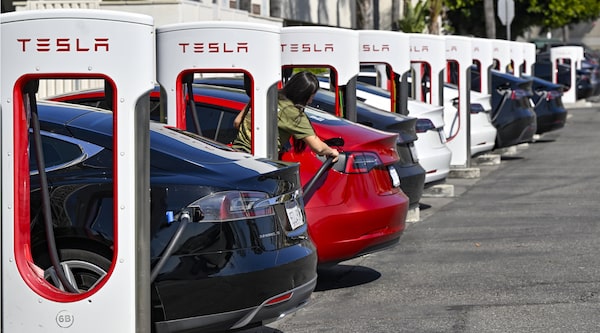Hi, I’m Samantha Edwards, an editor at The Globe and Mail. Welcome back to Lately, The Globe’s new tech newsletter – and if you’re here for the first time, welcome! Every Friday morning, I break down the week’s biggest tech stories and how they intersect with – and even change – our world.
In this issue
🤑 Ottawa plans to tax the rich. Tech leaders are not happy
📉 More layoffs in the tech world
📱 TikTok unveils its Instagram wannabe
💔 The dating apps are not okay
Tech leaders unimpressed with Ottawa’s plan to tax the rich

Deputy Prime Minister and Minister of Finance Chrystia Freeland presents the federal budget on Tuesday, April 16, 2024.Adrian Wyld/The Canadian Press
The federal government released its budget on Tuesday, which includes the $2.4-billion in AI funding we mentioned last week, $1.5-billion for a national pharmacare plan and $6.1-billion for the long-awaited federal disability benefit. So how will the Ottawa pay for all of this? Taxing the rich.
The government is boosting the taxes payable on capital gains, which are the profits made when a business or individual sells an asset such as stocks or property. For corporations, the taxable portion of capital gains will rise from one half to two-thirds. For individuals, the taxable portion will increase by the same amount on capital gains above $250,000. The government says these measures would add $19.4-billion to its coffers over five years.
But Canada’s tech leaders are not too happy about these changes. In an open letter released on Wednesday, the tech industry group Council of Canadian Innovators said the budget could discourage founders and tech workers from starting companies and deter venture funding by reducing the profits that investors can earn.
Trouble in tech land

Tesla announced this week it's cutting 10 per cent of its workforce.Jeff Gritchen/The Associated Press
It continues to be a rough year for tech workers. Tesla is laying off more than 10 per cent of its global work force – around 14,00 people – as the company faces stiff competition from Chinese EV makers and declining sales. Earlier this month, Elon Musk announced Tesla was shelving its long-touted affordable EV and would instead focus on self-driving taxis. Although investors are usually big on job cuts because it can lead to higher profits, they weren’t this time: by end of day Monday, Tesla shares were down more than 5 per cent.
Google also announced Wednesday it was laying off an unspecified number of employees, with cuts affecting Google’s real estate and finance departments, according to a Business Insider report. In January, Google laid off hundreds of workers in engineering, hardware and voice assistance teams as the company focuses on generative AI.
The platforms are starting to look alike – again

A three-part meme I saw on my "For you" page on TikTok NotesHandout
TikTok launched its Instagram competitor, TikTok Notes, on Thursday, with a new app for posting still images and text. The main feed is separated into two sections “for you” and “following,” and is organized into a two-column grid, similar to the Pinterest app.
Meta, the company that owns Instagram, has a long history of lifting ideas from other social media platforms. Stories is basically Snapchat, Reels is a dupe of TikTok, and Threads is almost a carbon copy of X.
TikTok Notes is currently only available in Canada and Australia. It’s still early days, but so far my “for you” algorithm is serving me almost exclusively Toronto restaurant recommendations and very janky memes, which I’m not exactly opposed to, but I’m also not sure is the type of content that would keep bringing me back.
Dumping the dating apps
This week's Lately episode looks at the evolutionary decline of dating apps.AKHTAR SOOMRO/Reuters
In our increasingly divisive world, there are few things we can all agree on. Yet there’s one belief that unites even the most polarized: dating apps truly are the worst. Although online dating has become the default way to meet new people, all the swiping and obsessing over writing witty prompts and juggling 15 chats has become demoralizing. The tech giants behind these apps are feeling the pain, too. Match Group and Bumble, which make up nearly the entire online dating industry by market share, have lost more than $40-billion in market value since 2021. This week’s episode of Lately looks at the evolutionary decline of dating apps and how economics affect our love lives.
What else we’re reading this week
- Locked boxes, rotary phones and app controls: Canadian parents try anything to curb kids’ phone use (The Globe and Mail)
- Small-time investors in Trump’s Truth Social reckon with stock collapse (The Washington Post)
- The invisible seafaring industry that keeps the internet afloat (The Verge)
- How the food industry pays influencers to shill blueberries, butter, and more (Bon Appétit)
- Killing the middlemen in the rideshare industry (How Things Work by Hamilton Nolan)
Soundbite
”If we know something’s addictive and it’s not good for their mental health, especially for preteen girls and teenage girls, why would we encourage access to it?” – Jacqueline Briggs, a post-doctoral researcher in Ottawa, on why she’s holding off buying her 12-year-old daughter a smartphone.
Adult Money

Could I be as efficient and professional as this businessman on his WalkingPad?Handout
In the first year of the pandemic, I bought a “compact” treadmill off Kjiji and fashioned it into a makeshift walking desk. It’s rudimentary: a couple metal brackets, a plank of wood and a very ergonomic laptop stand (i.e. a puzzle box). It’s noisy and a bit rickety, but it did the trick, helping me boost my step count on days I skipped my little mental health walk.
Lately, my TikTok feed is full of young remote workers strolling through their days on walking pads, easily racking up more than 10,000 steps in a workday. Research has found that using a treadmill desk is associated with better recall and attention, less stress and more satisfaction than standing.
But treadmill desks are not cheap – WalkingPad’s foldable mini treadmill costs US$420, which is a lot of money for something that I could do for free outside. However, as someone who places too much self-worth on my step count, this piece of exercise equipment-meets-multitasking gizmo is very, very tempting.
What purchases are you contemplating spending your Adult Money on? Did you just buy something that feels totally worth the hype? Tell me about it sedwards@globeandmail.com
Culture radar

The use of artificial intelligence is a sticking point in the negotiations between the Writers Guild of Canada and Canadian Media Producers Association.Devrimb/iStockPhoto / Getty Images
The battle against robots in writer rooms comes to Canada
Since October, 2023, the Writers Guild of Canada and the Canadian Media Producers Association have been negotiating a new contract, with artificial intelligence as one of the major sticking points. The WGC, which represents TV and film screenwriters, wants the new contract to include AI protections: no using WGC materials to train AI, no using AI at the development stage without also contracting writers, and the requirement to disclose when AI is being used by either the WGC or CMPA.
WGC members are now voting on strike authorization, which if passed, would allow the union to call a strike. Down south, the Writers Guild of America won similar AI guardrails in their latest contract, but it came after a long 148-day strike. A prolonged strike here in Canada could have devastating effects on an industry still recovering from the Hollywood strikes. Don’t make the people wait for a new season of Law & Order Toronto: Criminal Intent.
 Samantha Edwards
Samantha Edwards